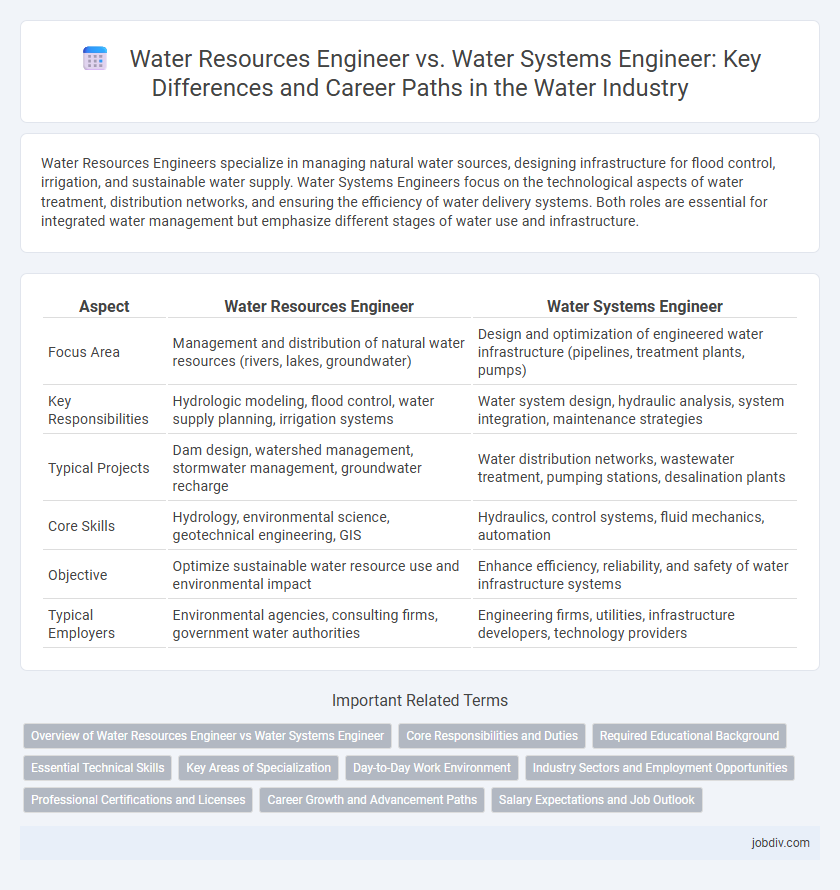Water Resources Engineers specialize in managing natural water sources, designing infrastructure for flood control, irrigation, and sustainable water supply. Water Systems Engineers focus on the technological aspects of water treatment, distribution networks, and ensuring the efficiency of water delivery systems. Both roles are essential for integrated water management but emphasize different stages of water use and infrastructure.
Table of Comparison
| Aspect | Water Resources Engineer | Water Systems Engineer |
|---|---|---|
| Focus Area | Management and distribution of natural water resources (rivers, lakes, groundwater) | Design and optimization of engineered water infrastructure (pipelines, treatment plants, pumps) |
| Key Responsibilities | Hydrologic modeling, flood control, water supply planning, irrigation systems | Water system design, hydraulic analysis, system integration, maintenance strategies |
| Typical Projects | Dam design, watershed management, stormwater management, groundwater recharge | Water distribution networks, wastewater treatment, pumping stations, desalination plants |
| Core Skills | Hydrology, environmental science, geotechnical engineering, GIS | Hydraulics, control systems, fluid mechanics, automation |
| Objective | Optimize sustainable water resource use and environmental impact | Enhance efficiency, reliability, and safety of water infrastructure systems |
| Typical Employers | Environmental agencies, consulting firms, government water authorities | Engineering firms, utilities, infrastructure developers, technology providers |
Overview of Water Resources Engineer vs Water Systems Engineer
Water Resources Engineers specialize in managing natural water cycles, focusing on hydrology, flood control, and the sustainable use of surface and groundwater resources for environmental protection and urban planning. Water Systems Engineers design and optimize infrastructure for water distribution, treatment, and wastewater management, integrating technology to enhance system efficiency and public health. Both roles are critical in addressing water scarcity and quality, with Water Resources Engineers emphasizing resource management and Water Systems Engineers concentrating on engineered water supply networks.
Core Responsibilities and Duties
Water Resources Engineers specialize in managing natural water resources through hydrological analysis, flood risk assessment, and sustainable groundwater management. Water Systems Engineers focus on the design, operation, and optimization of engineered water infrastructure such as treatment plants, distribution networks, and wastewater systems. Both roles require expertise in hydraulic modeling, but Water Resources Engineers emphasize environmental impact and resource conservation while Water Systems Engineers prioritize system reliability and efficiency.
Required Educational Background
Water Resources Engineers typically require a bachelor's degree in civil or environmental engineering with a focus on hydrology, hydraulics, and water management. Water Systems Engineers often hold degrees in water resources engineering, environmental engineering, or related fields, emphasizing systems design, modeling, and infrastructure optimization. Advanced coursework or certifications in GIS, fluid mechanics, and water treatment technologies are highly beneficial for both roles.
Essential Technical Skills
Water Resources Engineers specialize in hydrology, fluid mechanics, and environmental impact assessment to manage water quantity and quality effectively. Water Systems Engineers focus on designing, operating, and optimizing water distribution, treatment, and wastewater systems using control systems and hydraulic modeling. Both roles require proficiency in GIS, CAD software, and regulatory compliance related to water management.
Key Areas of Specialization
Water Resources Engineers specialize in hydrology, watershed management, and flood control, focusing on sustainable water supply design and stormwater runoff modeling. Water Systems Engineers concentrate on water distribution networks, treatment facility operation, and infrastructure maintenance, optimizing system efficiency and water quality management. Both roles require expertise in hydraulic modeling, but Water Resources Engineers prioritize natural resource conservation, while Water Systems Engineers emphasize engineered delivery systems.
Day-to-Day Work Environment
Water Resources Engineers typically focus on managing natural water systems, analyzing hydrological data, and designing infrastructure for flood control, irrigation, and water supply within environmental regulations. Water Systems Engineers primarily work on developing and maintaining artificial water distribution and treatment networks, ensuring system efficiency, reliability, and compliance with health standards through technical troubleshooting and system optimization. Both roles require collaboration with multidisciplinary teams but differ in their emphasis on either natural water cycle management or engineered water system operations.
Industry Sectors and Employment Opportunities
Water Resources Engineers primarily work in sectors such as environmental consulting, government agencies, and hydropower, focusing on managing natural water systems and flood control. Water Systems Engineers are employed mainly in municipal water supply companies, wastewater treatment facilities, and infrastructure design firms, concentrating on the development and maintenance of water distribution and treatment systems. Employment opportunities for Water Resources Engineers often involve watershed management and sustainability projects, while Water Systems Engineers find roles in urban planning and industrial water management.
Professional Certifications and Licenses
Water Resources Engineers typically pursue certifications such as the Professional Engineer (PE) license with a focus on civil or environmental engineering, and may also obtain certifications from the American Water Resources Association (AWRA). Water Systems Engineers often seek credentials like the Certified Water Technologist (CWT) or certifications from the Water Environment Federation (WEF), emphasizing expertise in water treatment and distribution systems. Both roles benefit from specialized training and licensure to validate skills in hydraulic modeling, water quality standards, and regulatory compliance.
Career Growth and Advancement Paths
Water Resources Engineers specialize in the management and sustainable development of water supplies, focusing on hydrology, flood control, and watershed management, which offers career growth in environmental consulting firms, government agencies, and infrastructure projects. Water Systems Engineers concentrate on designing and optimizing water supply and wastewater treatment systems, advancing into roles involving system integration, smart water technologies, and infrastructure asset management. Both career paths offer opportunities for leadership roles in project management, policy development, and technical innovation within the water engineering sector.
Salary Expectations and Job Outlook
Water Resources Engineers typically earn an average salary ranging from $70,000 to $105,000 annually, reflecting their focus on managing and designing water supply and flood control systems. Water Systems Engineers, specializing in the development and maintenance of water distribution and treatment infrastructure, have salary expectations between $75,000 and $110,000 per year. Both roles show strong job outlooks with projected employment growth of 6% to 10% over the next decade, driven by increasing demand for sustainable water management and infrastructure modernization.
Water Resources Engineer vs Water Systems Engineer Infographic

 jobdiv.com
jobdiv.com